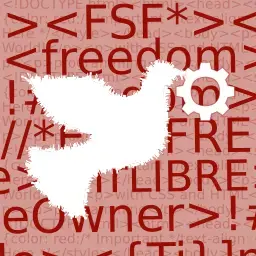- cross-posted to:
- linux@programming.dev
- cross-posted to:
- linux@programming.dev
Removed by mod
yikes
I do wish this was under the GPLv3 but you can’t have it all
I’d love to hear your thoughts on why you feel the GPLv3 is better than the BSD2-clause license LadyBird is using.
GPLv3 is virally open source (copyleft), BSD 2-Clause is not.
GPLv3 ensures free software remains free and contributions cannot be exploited and withheld from the community. BSD2C does not.
GPLv3 is virally open source (copyleft), BSD 2-Clause is not.
Your first statement is patently false and misleading.
Two variants of the license, the New BSD License/Modified BSD License (3-clause), and the Simplified BSD License/FreeBSD License (2-clause) have been verified as GPL-compatible free software licenses by the Free Software Foundation, and have been vetted as open source licenses by the Open Source Initiative. (Wikipedia)
Being “copyleft” is not a requirement for being open source. Maybe you’re thinking of free software. There are differences, but as the FSF is quoted, they are also very similar.
GPLv3 ensures free software remains free and contributions cannot be exploited and withheld from the community. BSD2C does not.
To my understanding, and if I’m wrong I’d love to know why, both GPLv3 and BSD2 both ensure the openness of software. They just go about it differently. GPL (I’m not super versed at v3) basically means any modifications to GPL’d code must also be GPL’d, and source made available; also, if you statically link against other GPL’d code, your code must be GPL’d. Dynamic linking (or linking against LGPL code, like glibc) does not have this requirement.
With BSD code, your only requirement is that the code (or binaries) must remain BSD2. Sure, someone can make modifications and keep them to themselves for fun and profit. But that doesn’t mean the rest of the community has to follow suit. The original code remains open and available with no license modifications. If a company owns BSD2 code, and goes under, the community can simply fork the code and take ownership as they please.
Neither license is perfect, and I’m sure we could find plenty of examples of people/companies that have abused both licenses.
You asked a simple question about “better” which is pretty subjective for whooping out the references along accusations of falsehood.
“virally open source”
Which answered the original question quite succinctly. I wish you would have read more carefully before…
I asked what the OP felt was better about GPLv3.
The person who responded made provably false statements. I know they are false, because I went to look it up; which is outlined in my “[whooped] out references”.
You still don’t read.
Enlighten me; what is it I’m missing?
GPLv3 makes a company publish the source under the same license. That means no Vivaldi, Chrome, Edge or any other spyware ad ridden browsers. I don’t think we need more lock in.
I understand your reasoning, but I think your logic is flawed. If Ladybird is GPLv3, then browsers will continue to use Chromium base which helps the Chrome monopoly. By making it BSD, it will help others adopt it.
We don’t need that much adoption we just need a engine that is capable of not screwing over everyone. We already have plenty of proprietary browsers.
Admittedly BSD may help Ladybug get more funding and development efforts.
I’d favour GPL3 too, but we do need wide adoption because that’s the only way an independent browser will influence websites not to just design for Chromium. That needs to happen for the new browser to have any impact on Google’s ability to dictate standards unilaterally.
Who are “we”?
The privacy and freedom community
You guys should make a browser engine
I’m normally in the camp that copyleft prevents enterprise adoption, and therefore limits users/contributors… but in this case I agree. I’d like browsers to be copyleft. I’d like to be able to see what kind of sketchy shit Edge and Chrome are throwing on top of Chromium and have it out in the open.
Question for the free software community…
If I used a headless version of a copyleft browser as part of an automated testing suite for proprietary enterprise software, does that violate the copyleft license?
Looks like it has a reasonable base. But they are targeting an alpha for early 26?
Oof.
Hey it looks like there is some thought behind this; starting a 501c3 and going from there.
Deep sigh…. Good luck Mr Gorkski
I legitimately thought
501c3was a commit hash before my brain engaged.You…I like you.
🤣🤣🤣
It takes time to start from the ground up. There are a huge amount of web standards and to do it right takes time. It took a long time from Chromium to become usable.
@possiblylinux127@lemmy.zip Pretty cool, but what about Servo? Why not work on it instead?
First Servo, now this. Good times ahead.
Randomly stumbled upon this community, pretty cool!
This is great. Can’t wait to use it.
Don’t get to excited as it is very new and will take a lot of time and money to stay alive.
Very cool though
I mean… considering that firefox is still kind of a clusterfuck for a surprising number of websites…
I am glad this exists but I see no practical use for it for… anyone. And the cynic in me thinks this will be even more ammunition for “just use chromium, it actually works” akin to the crowd who insist on telling every single person who is considering trying out linux to use arch or gentoo.
… Is it?
I genuinely haven’t encountered anything broken using it, short of Youtube. And that’s less Firefox and more all the extensions trying to make it usable, I think. There are a couple of bits of functionality missing, but in terms of sites working, it seems perfectly fine.
I’ve also encountered a few issues with Firefox on mobile, but not enough to stop using it as my daily driver.
I don’t really blame Firefox though, I’d guess that their implementation is closer to the spec than Chrome’s but that companies are cheaping out on testing in multiple browsers.
The search function of the Walmart site was broken for a year or two on mobile but it seems it’s been fixed. A few webpages I needed for school explicitly weren’t supported in non-chromium browers.
Sonys website breaks for me
Square enix bitches every fucking time
Some other niche sites I use also break in weird and violent ways sometimes
All tested with all add-ons disabled to see if that fixed them, all failed
Lol, downvote me all you want you fucking weridos, doesn’t change the facts
Huh. I’ve used Sony’s site recently and I just opened it to see if I noticed anything broken but it seems fine. Of course somebody not seeing a bug doesn’t mean the bug doesn’t exist, it’s not that I don’t believe you. All I’m saying is I’ve been primarily on Firefox for a while now and that hasn’t been my experience.
This was my thought, as well. It also reminds me a bit of this classic xkcd.
We saw the best innovation during the most competitive times in the browser market.
I think either this will die soon or more likely it will be noticed my companies that have been screwed by Google. Google has made lots of unpopular choices with Chromium and I wouldn’t be surprised if at least a few companies started funding it in hopes that it might be viable in 5 years. It took a long time to create Chromium.
If they aren’t funding Mozilla, which is a far more significant company with a long history of browser development, the chances they’re gonna fund a brand-new browser that very few people have even heard about is next to none.
They aren’t funding Mozilla as Mozilla is built on egg shells
While mozilla/firefox is indeed a giant mess of legacy code: Why would a company instead support a hobbyist project with almost zero resources?
At that point we are in the mythical “What if the small business of the world united and made their own product” territory
It doesn’t have zero resources. It has at least 1.2 million dollars
It is not exclusively Firefox but Mozilla corp has 750 staff and 593 million in revenue according to Wikipedia.
One million is maybe ten part time developers for a year.










